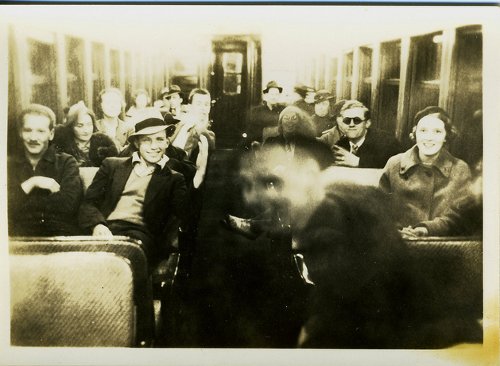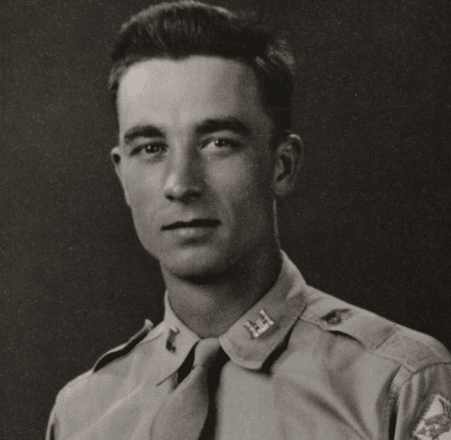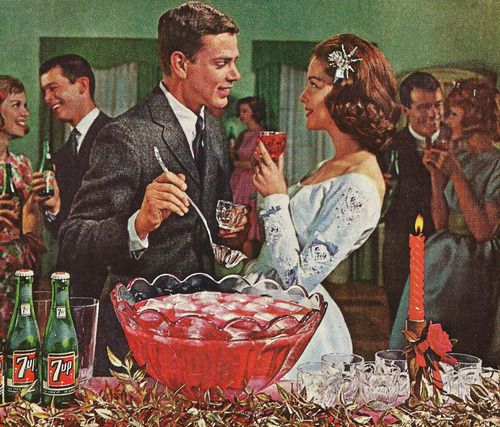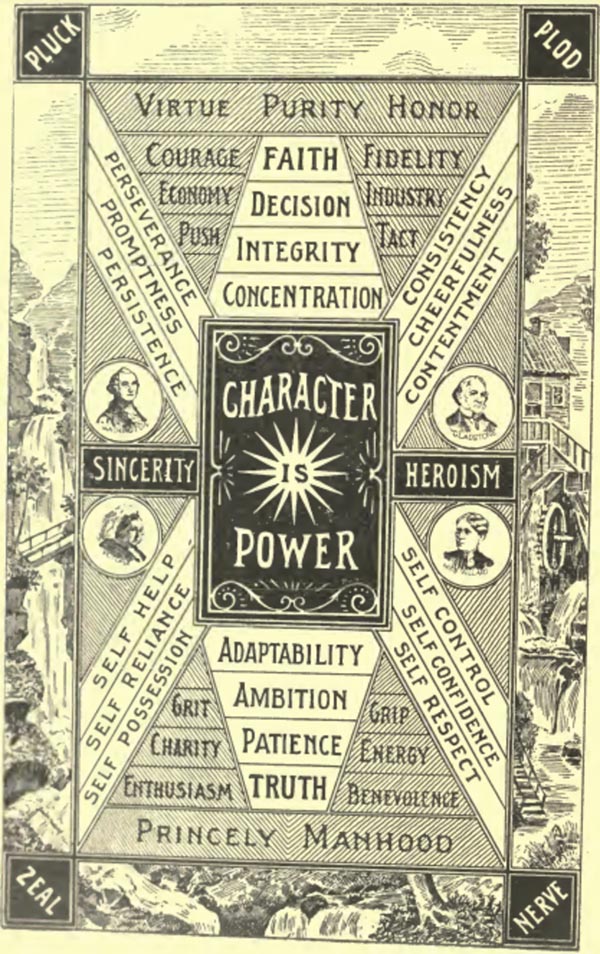
With our archives now 3,500+ articles deep, we’ve decided to republish a classic piece each Friday to help our newer readers discover some of the best, evergreen gems from the past. This article was originally published in June 2013.
Character. Like honor, it’s a word we take for granted and probably have an affinity for, but likely struggle to define and articulate. It’s a word most men desire to have ascribed to them, and yet the standards for its attainment remain rather vague in our modern age.
It’s certainly not a word that’s used as much as it once was. Cultural historian Warren Susman researched the rise and fall of the concept of character, tracing its prevalence in literature and the self-improvement manuals and guides popular in different eras. What he found is that the use of the term “character” began in the 17th century and peaked in the 19th – a century, Susman writes, that embodied “a culture of character.” During the 1800s, “character was a key word in the vocabulary of Englishmen and Americans,” and men were spoken of as having strong or weak character, good or bad character, a great deal of character or no character at all. Young people were admonished to cultivate real character, high character, and noble character and told that character was the most priceless thing they could ever attain. Starting at the beginning of the 20th century, however, Susman found that the ideal of character began to be replaced by that of personality.
But character and personality are two very different things.
As society shifted from producing to consuming, ideas of what constituted the self began to transform. The rise of psychology, the introduction of mass-produced consumer goods, and the expansion of leisure time offered people new ways of forming their identity and presenting it to the world. In place of defining themselves through the cultivation of virtue, people began to express themselves through hobbies, dress, and material possessions. Susman observed this shift through the changing content of self-improvement manuals, which went from emphasizing moral imperatives and work to personal fulfillment: “The vision of self-sacrifice began to yield to that of self-realization.”
While advice manuals of the 19th century (and some of the early 20th as well) emphasized what a man really was and did, the new advice manuals concentrated on what others thought he was and did. In a culture of character, good conduct was thought to spring from a noble heart and mind; with this shift, perception trumped inner intent. Readers were taught how to be charming, control their voice, and make a good impression. A great example of this is Dale Carnegie’s How to Win Friends and Influence People from 1936. It focused on how to get people to like you and how to get others to perceive you well versus trying to improve your actual inner moral compass.
Susman argues that the transformation from a culture of character to a culture of personality was ultimately about a shift from “achievement to performance.” Susman illuminates this difference by noting that while the words most associated with character in the nineteenth century were “citizenship, duty, democracy, work, building, golden deeds, outdoor life, conquest, honor, reputation, morals, manners, integrity, and above all, manhood,” the words most associated with personality in the twentieth were “fascinating, stunning, attractive, magnetic, glowing, masterful, creative, dominant, and forceful.”
There’s nothing wrong with the cultivation of personality, and we’ve offered plenty of advice on it here on the site. It can help you navigate the world, form relationships, and become successful. But personality is absolutely no substitute for character, which should be the foundation of every man’s life.
Thus today we will be exploring the true nature of this largely forgotten ideal. We’ll be doing so by tapping into the writings of the late nineteenth and early twentieth centuries, when character was still king.
What Is Character?
The etymology of character is quite telling. The word comes from the Greek kharakter for “engraved mark,” “symbol or imprint on the soul,” and “instrument for marking,” and can be traced further back to the words for “to engrave,” “pointed stake,” and “to scrape and scratch.”
Anciently, a character was the stamp or marking impressed into wax and clay, and as Henry Clay Trumbull explains in 1894’s Character-Shaping and Character-Showing, it served as:
another name for the signature, or monogram, or personal superscription, or trade-mark, of the potter, the painter, the sculptor, the writer, or any other artist or artisan, or inventor, as indicative of the personality of the maker, or of the distinctive individuality of the article marked. It is the visible token by which a thing is distinguished from every other thing with which it might otherwise be confounded.
In the 17th century, the word came to be associated with “the sum of qualities that defines a person.” These qualities included a man’s intellect, thoughts, ideas, motives, intentions, temperament, judgment, behavior, imagination, perception, emotions, loves, and hates. All of these components, William Straton Bruce writes in 1908’s The Formation of Christian Character, “go to the shaping and coloring of a man’s character. They have all some part in producing that final type of self, that ultimate habit of will, into which the man’s whole activities at last shape themselves.”
The balance of these components within the soul of each man, and the way one or another predominates over others, is what makes a character unique and sets apart one individual from another.
It should not be thought, however, that character is synonymous merely with personal tastes, temperaments, and preferences. Things like how you dress, your favorite music, or whether you are introverted or extroverted have little to nothing to do with character. Rather, character is defined in how your habits, motives, thoughts, and so on relate to morality, particularly as it concerns integrity. Character was defined as “your moral self,” the “crown of a moral life,” and referred to as a “moral structure,” something you built through virtuous behavior. Bruce writes:
Character is nature and nurture. It is nature cultured and disciplined, so that natural tendencies are brought under the sway of the moral motive. His natural individuality marks off a man from his fellows by clear and specific differences. But this individuality may be non-moral. To produce character it must be brought under discipline, and organized into the structure of a true moral being . . .
Above all, [character] includes a choice, a settled habit or bent of will, so that it can be seen in its outcome in conduct. Character takes up the raw material of nature and temperament, and it weaves these into the strong, well-knit texture of a fully moralized manhood.
The 3 Qualities of True Character
To better understand the nature of character, we now turn to James Davison Hunter who laid out the three qualities of true character in his modern book, The Death of Character:
Moral Discipline
We cannot differ as to the need in our national character of those qualities of self-control, of quick and unquestioning obedience to duty, of joyful contempt of hardship, and of zest in difficult and arduous undertakings which, rightly or wrongly, we consider soldierly, which we attribute in such rich measure to our forefathers, and which the moral exigencies of our national task to-day as peremptorily demand. To put these primary and elemental needs as sharply as possible, let us call them discipline and austerity. Our American character needs more of both. –Robert Elliott Speer, The Stuff of Manhood, Some Needed Notes on American Character, 1917
The one quality most associated with character in the nineteenth century was self-mastery — the dominion of an individual over his impulses and desires, so that he was in control of them, and not the other way around. A man of self-mastery embodies the kingship of self-control and can direct his will and make his own choices, rather than being a slave to his base impulses.
Moral discipline is also a quality that not only allows a man to bear hardship stoically, but even to actively seek out a rougher, more austere life, one that eschews the kind of indulgence that deprives character of needed training and leads to softness.
Moral Attachment
The pursuit of character does not have as its sole end the cultivation of self. Susman notes that it is in fact “a group of traits believed to have social significance and moral quality,” and he found that the most popular quote related to character during the nineteenth century was Ralph Waldo Emerson’s definition of it as: “Moral order through the medium of individual nature.” This is to say that the choices each single person makes influences the world around him, and that the existence of a virtuous society is predicated on the virtue of each of its individual members. Moral attachment means being committed to a set of higher ideals and to acting, and if need be, sacrificing, for the greater good of one’s community. Speer beautifully explains the meaning of this essential quality of character:
The moral elements of individual character are inevitably social . . . When a man ‘has trained himself,’ to use the words of Lord Morley in dealing with Voltaire’s religion, ‘to look upon every wrong in thought, every duty omitted from act, each infringement of the inner spiritual law which humanity is constantly perfecting for its own guidance and advantage . . . as an ungrateful infection, weakening and corrupting the future of his brothers,” he views each struggle within his own soul against evil and each firm aspiration after purity not as a mere incident in his own spiritual biography but as a fight for social good and for the perfecting of the nation and of humanity. And the struggle for social good and the perfecting of human life is fundamentally a struggle for the triumph of ideals in personal wills. God can take hold of men only in man. He revealed Himself and wrought redemption less by a social process than by a personal incarnation. And the only way of which we know to uplift the life of the nation and to fit it for its mission and its ministry is to reform our own and other men’s characters, and ourselves to be what manner of man among men we would have the nation be among nations.
Moral Autonomy
Character cannot develop in an environment in which ethical decisions are forced upon the individual. Character is a product of judgment, discretion, and choice — born from a man’s free agency. A decision that is coerced cannot be a moral decision, and thus cannot be a decision of character.
Davison summarizes the definition of character thusly: “Character, in a classic sense, manifests itself as the autonomy to make ethical decisions always on behalf of the common good and the discipline to abide by that principle.”
How Does Character Develop?
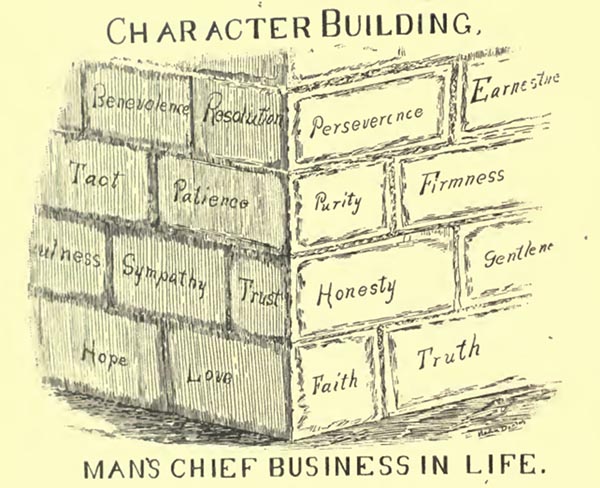
Character gains through its expression, and loses through its repression. Love grows through its expression. Sympathy grows through its expression. Knowledge grows through its expression. The artistic sense grows through its expression. The religious sentiment grows through its expression. The capacity for instruction, for administration, for command, grows through its expression. The more a man does in any line of wise endeavor, the more he can do in that line, and the more of a man he is in that line. And the refraining from the free expression of love, or of sympathy, or of knowledge, or of the artistic sense, or of the religious sentiment, or of the power of instruction, of administration, or of command, both limits and lessens that which is thus repressed.
To possess and to exhibit an admirable personal character is a duty incumbent on every one. In order to possess such a character, its exhibit by its expression is a necessity. He who does not endeavor to express those traits and qualities which are the exhibit of an admirable personal character, cannot hope to retain such a character, even if it were his by nature; and he who does endeavor to express them, can hope to gain the character which they represent, even though he lacked it before. –Henry Clay Trumbull, Character-Shaping and Character-Showing, 1894
There are many things that engrave our character upon the clay of our lives, and shape our character for better and for worse into a unique set of scratches and grooves. Our character begins to be shaped from the very time we are born and is influenced by where we grow up, how we are raised, the examples our parents provide, religious and academic education, and so on. Our character can be dramatically altered by a life-changing tragedy — the contraction of a disease, a severe accident, the death of a parent, child, or spouse. Such events may turn a man bitter or cynical, or may cause him to discover energies of soul and feelings of hope and compassion hitherto unimagined. A man’s character can also be greatly formed by a call to take upon himself a mantle of leadership during a crisis or emergency — an event that tests and exercises his physical and mental abilities.
One of the greatest influences on our character is those with whom we surround ourselves, as Speer explains:
The important elements of character-making — or character-shaping — which we are most likely to overlook or undervalue are the exceptional impressions made upon us by casual acquaintances in our earlier life, and the quieter influences exerted over us by those with whom we are closely associated in after years — when our characters are commonly supposed to be fully and finally established. If we could trace back to their first exhibit some of the characteristics which now mark us most distinctively, we should perhaps find that we owe their development, not to the steady training in their direction received by us at home or in school, but to the sudden disclosure of their attractiveness in the life of some one whom we were with but for a brief season; or, again, we should see that the temptations which try us most severely, and the evil thoughts and imaginings which have given us greatest trouble in life, are the outgrowth of germs planted in our minds by persons of whom we have no distinct recollections apart from the harm they thus did us.
Nor is it in childhood only that our characters are shaped and directed by our associates. The best characters are always open to improvement, and always in danger of deteriorating. Many a husband seems actually made over by his wife; and many a wife seems absolutely another person through her husband’s influence, after a few years of married life. It is perhaps a friend of our maturer years whose purity and nobleness, whose gentleness and grace, whose spirit of fairness and charity, or whose well-defined views on every point of ethics where he has a conviction, impress us with the correctness and beauty of his ideal, gradually influence us to his ways of thinking, and inspire us to strive toward his standards of judgment and feeling.
Or again, our moral tone is lowered and our tastes are vitiated by intimate companionship, in social life or in business, with one of grosser nature, or of perverted and debased tendencies. Characteristics which had been long repressed in our nature come into new prominence, and those which had before distinguished us drop out of sight. So long as we live, our characters are in the formative state; and whether we be counted strong or weak, our characteristics are continually being re-shaped and re-directed by those whom we newly come to know and admire, or with whom we are newly brought into intimate association. A fresh ideal held before us, a purer, nobler, lovelier character coming distinctly into our range of observation and study, is something to thank God for; for it may be an inspiration to us, and a help toward the better and higher development of our characters than we have before realized.
As we can see, many factors, some beyond our control, play a role in molding our character. But the single greatest influence on our character is that which we have ultimate power over: how we respond to circumstances. Writers of the 19th century agreed that the true exercise and test of a man’s character was whether he would hold to his moral principles no matter how sorely tempted or how painful the repercussions. In 1888’s Creed and Character, Henry Scott Holland writes:
At all costs, character must show itself to be free and above its circumstances. If a man is the creature of circumstances we call him a man without character; changing with all the changing hours, he has no self-identity, and character is that with which we identify a man. Character is vital and vigorous so far only as it insists on making itself free room for action amid the thronging events, and it dies down as soon as it fails to hold itself aloof and separate from circumstances. Character is the reaction from circumstances. It is the inner movement which encounters and withstands the shock of change and outward things. And it must, therefore, issue from a life that directs itself.
Many men feel like character is something that can only be built during dramatic tests and crises. But it is truly in “the constant, habitual, hurried, routine acts of common life that that swarm of little judgments is made such as form the character.” We would do well to remember that we are “being made every minute, and we cannot help it — you and I, as we walk and talk, eat and drink, marry and are given in marriage, work and play, go out and come in.”
As we are faced with varying circumstances each day and judge and decide how to act, our actions become our habits, and our habits become our character, as Speer explains:
By means of the will man passes from an intellectual state into act and deed. And these activities of the mind are not merely isolated movements; they become links in a series of actions and acquire permanence. The agent throws himself into these acts; and in the exercise of knowing and willing he becomes characterized by his own deeds. The more frequently he does the act, the more easy and pleasurable does it become. And this blending of pleasure and volition creates that tendency or bias towards doing it that we denominate Habit. Therefore it is that we have spoken of character as a habit of will.
Why Develop Character?
Men of character are the conscience of the society to which they belong. –Ralph Waldo Emerson
Deciding to become a man of character means choosing to live a more disciplined and less selfish life. So why undertake such a hard path?
Both classical and biblical cultures believed that the character of each individual was tied to the health of the society as a whole. The founding fathers argued that the citizenry’s commitment to living a life of character was the key in the success or failure of the republican experiment. “The steady character of our countrymen,” Thomas Jefferson said, “is a rock to which we may safely moor. It is the manners and spirit of a people which preserve a republic in vigor. A degeneracy in these is a canker which soon eats to the heart of its laws and constitution.”
In a similar vein, James Madison wrote: “Is there virtue among us? If there be not, we are in a wretched situation. No theoretical checks — no form of Government can render us secure. To suppose that any form of Government will secure liberty or happiness without any form of virtue in the people, is a chimerical idea.”
The founders rightly saw that without a people of character there could be no trust and justice, and thus no true community or stability. No true pursuit of happiness.
What benefits the whole, benefits the individual as well. As Speer puts it, “only hardness can make a great soul” and the cultivation of character gives us the inner exercise that makes our souls grow:
It is only where we have gone that we know the way; it is only the experience in life that we have passed through that gives us our true knowledge of life, because the end of life is its relationships, and wealth of life depends on the breadth of true knowledge and the riches of true relationship. Smoothness of life is simply deadening because it keeps us out of what is real life . . .
[The] indulgent life [is worthless] because it cannot connect men and women with the real springs of strength and of power. No strong man was ever made against no resistance. We develop no physical power by putting forth no physical effort. All the strength of life we have we get by pushing against opposition. We acquire power as we draw it out of deep experience and effort.
A life of indulgence and ease, Speer concludes, “leaves men and women weak, with no strength either themselves to bear or to achieve for others.”
Without seeking the power and strength that comes from building one’s character, we will lament that when we need the power of self-mastery, we do not have it:
And in our own lives the easy education does not go easily all the way. There comes a time when, having always indulged ourselves, we can’t break the habit; when, never having taken our lives in our hands and reined them to the great ministries of mankind, we discover that we cannot. We find that we obey our caprices; follow any impulse; cannot stick to any task; do not know a principle when we see it; have no iron or steel anywhere in our character; are the riffraff of the world that the worthy men and women have to bear along as they go.
Character offers a form of freedom that seems foreign in our modern age, but at least for me personally, still deeply resonates:
There is no freedom outside of character. Liberty, as Montesquieu says, is not freedom to do just as we please. Liberty is the ability to do as we ought. And the freedom that we need is not the freedom of caprice and whim and listening to our impulses. It is the freedom that enables our eyes clearly to see what right is, and then empowers us to do it.
Speer also reminds us that just as the companions we choose can mold our character, so can we mold others:
We are ourselves the shapers and directors of the characters and the characteristics of some whom we meet or reach. This thought ought to give us a sense of added responsibility and of added anxiety. What we are may settle the question of what a multitude of others shall be and shall do. Our lives and characters are entering into and becoming a part of the lives and characters of those whom we never knew until recently, and their lives and characters are entering into and becoming a part of ours. The composition of their and our characters is still in progress.
Is our character influencing others for good and helping them build their own power and strength? Are we doing our part to be a man of character and infuse our culture and nation with vitality? What grooves and lines are you engraving upon your character each and every day? Character is our legacy — what will yours be?



